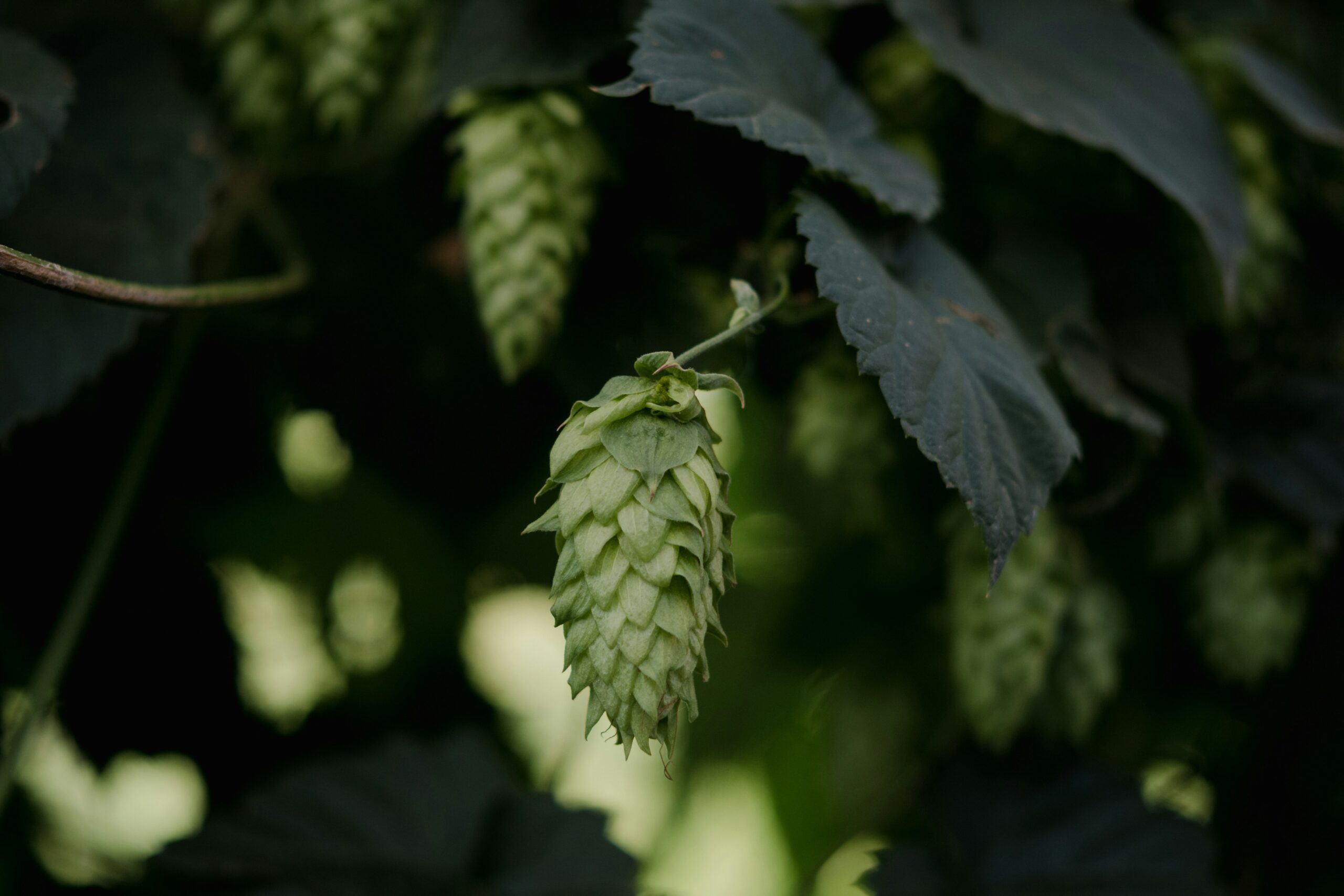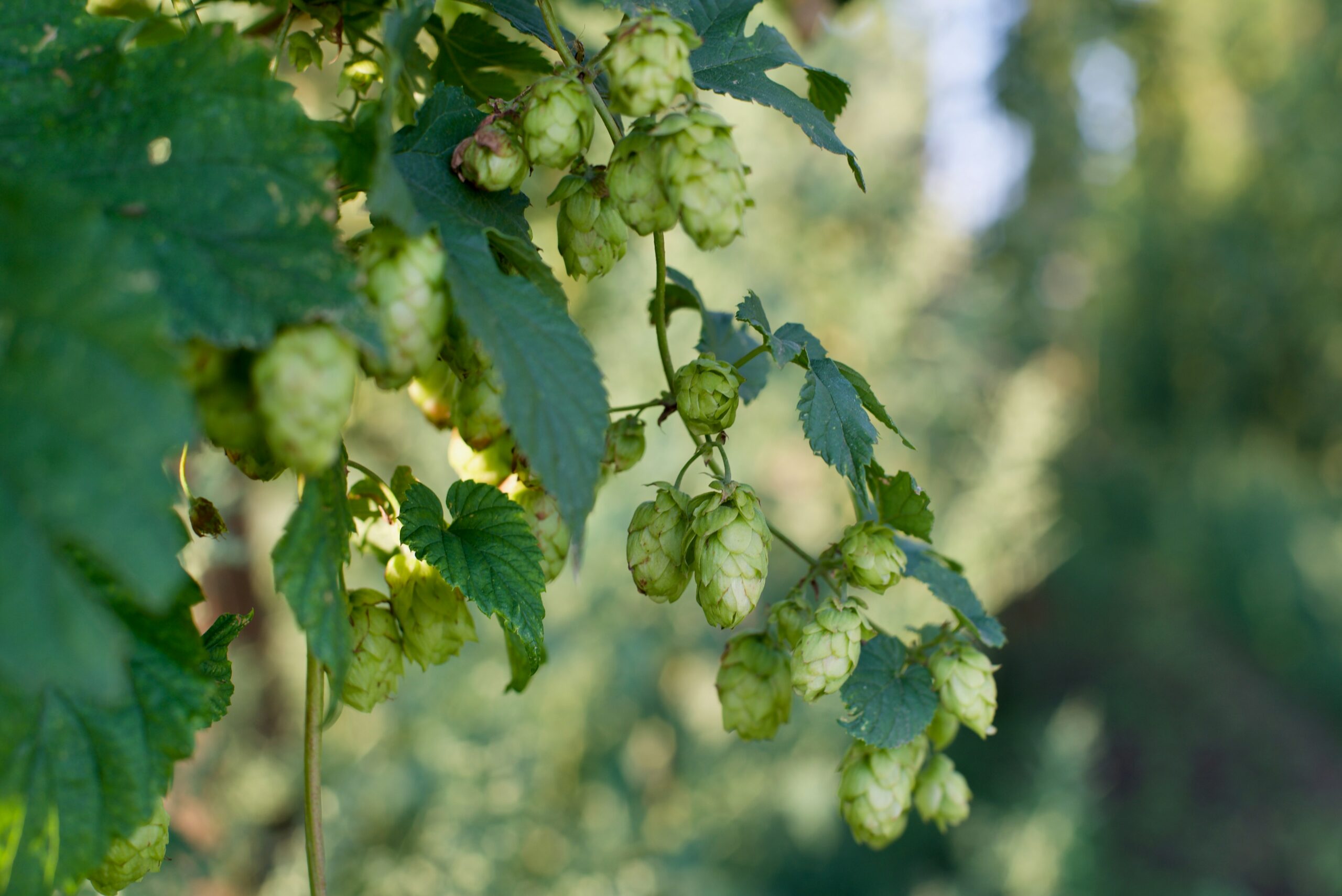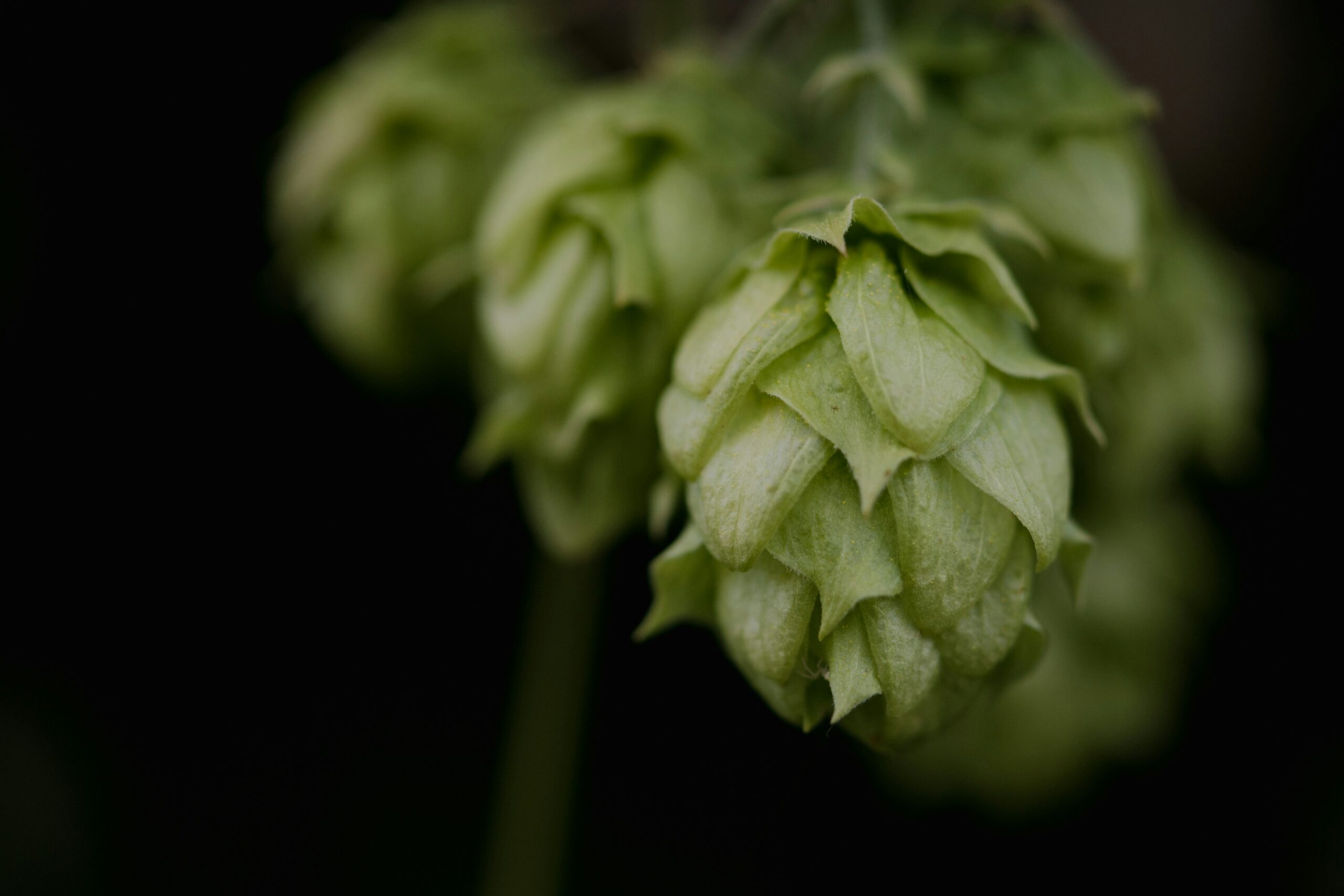Hops are a perennial plant, with the largest producers being Germany, the USA, China, and the Czech Republic. This plant occurs mainly in the temperate climates of the north and southern hemispheres. Hops are a well-known and long-cultivated plant for humans.
Hops are a genus in the cannabis family known for climbing plants. One distinct characteristic of hops is its cone-like pericarp. Hops are mainly composed of many different parts. Most of the hops used today are technically cones, but other regions, such as leaves, stems, and rhizomes, are also functional.
Hops are primarily recognized in the food sector. Historically, they likely served as an additive to fermented cereal-based brews, early versions of beer. This additive was not to add flavor but to ensure the preservation of the brew. Hops are now almost a no-brainer addition to beer. There are other kinds of hops. The most widespread by far is common hops. Hops are the plants used in the beer brewing process, but plants are also used in herbal medicine and cosmetology.

Traditionally, hops are used in the beer industry, but more widely, hops also have therapeutic relevance. Despite the preponderance of writings about hops being more related to their applications to brewing, hops have been applied for numerous diseases and conditions. Hops is an ancient medicinal plant. There are ancient references to hops used by healers to treat leprosy and other issues. Hops are associated with improving health and are viewed as life-prolonging plants. Today, hops or special hops raw materials with unique health effects are commonly used in commercial dietary supplements. Discover the ultimate hops properties that you haven't heard of.
Common hops (Humulus lupulus![]() ) cones are known mostly as beer raw materials, where they impart characteristic bitterness and aroma to the beverage. However, just as important was the fact that the health-promoting properties of this plant were known to man several thousand years ago. Several studies reveal the impressive possibility of hops in medical practice. This turns beer into a natural food that, if consumed sensibly, could be an unlimited source of health-promoting ingredients.
) cones are known mostly as beer raw materials, where they impart characteristic bitterness and aroma to the beverage. However, just as important was the fact that the health-promoting properties of this plant were known to man several thousand years ago. Several studies reveal the impressive possibility of hops in medical practice. This turns beer into a natural food that, if consumed sensibly, could be an unlimited source of health-promoting ingredients.
Today, we know that nutrition plays a crucial role in preventing diseases. Hops also belong to those plant foods that contain beneficial chemicals in favor of human health. Now, the positive properties of hops are still mostly obtained from beer, but this will change soon. Hops extracts could be customized to implement functional foods originating from foods. Hops-based supplements have already made it to the shelves of the nearest health food stores and pharmacies. You can explore the health benefits of hops.
Scientists have long known that hops can have incredible power. Today, we have scientific evidence to confirm what we know about the components of hops that work with antioxidant activity. The plant's polyphenols are potent antioxidants across various chemical oxidation systems, as their reactive oxygen species scavenging activity suggests. These radicals bear oxidative stress and may be closely involved in the spite and pathogenesis of cancer and other diseases or the aging process. That is why antioxidant power is one of the most valuable attributes of foods and herbal preparations.

One of the reasons beer is considered a miracle beverage by those who appreciate it is not just the taste that people love but also the fact that it has a long shelf life and is a microbe-free drink. Hops provide a characteristic mode of inhibition of microbes. Different species of gram-positive bacteria spoil the beers by increasing the turbidity and producing unwanted aromatic compounds.
Consequently, hops can prevent the development of pathogenic bacteria, a point that might be significant in a clinical setting. The next report deals with the group usage of hops materials and antibiotics, which scientists have likewise reported. This property has been exploited to evaluate fresh hops' ability to inhibit Helicobacter pylori![]() growth. While there is extensive literature regarding the bioactivity of hop compounds, very little is known concerning the antiviral activity of hop.
growth. While there is extensive literature regarding the bioactivity of hop compounds, very little is known concerning the antiviral activity of hop.
Another health influence of hops might be a surprise. Hop is a relaxing plant, but did you know that? Hops show possible central nervous system effects in studies. It should be noted that in ancient times, these properties were already suspected. In workers who worked in harvesting and processing hop cones, symptoms of fatigue and drowsiness without physical fatigue are reported. Various pharmacological textbooks from the previous century also touched on these elements, such as the effects of hop extracts that would help comfort or enhance sleep quality.
We now know that the mechanism primarily entails the inhibition of certain neurotransmitter receptors by hops' ingredients. Hops are commonly included in medicinal products combined with other sedative or calming substances, e.g., valerian![]() . In this manner, the plant amplified the effectiveness of the medicine.
. In this manner, the plant amplified the effectiveness of the medicine.
We are already aware of hops working on said neurons. Could it serve a protective role in this region? Of course, it can! Here, too, this plant has an upper edge. Research indicates that a diet rich in polyphenols found in hops may lower the risk of neurodegenerative diseases![]() , including dementia, Alzheimer's disease, or Parkinson's disease.
, including dementia, Alzheimer's disease, or Parkinson's disease.
Oxidative stress is very relevant to neurodegenerative disorders and brain aging, and hops can inhibit oxidative stress through their antioxidant effects. These results also suggest that hop products not only soothe the mind but also prevent it from potentially toxic stimuli that enhance aggression and feelings of revenge.

As you probably know, cancer treatment is exhausting and expensive. This makes cancer prevention very important, and many research works study anticancer compounds. Such studies have also involved hops. Curious about the results? Many studies confirm the antiproliferative effects of hop polyphenols and other secondary metabolites against carcinogenesis during the last decades. This is great news. Evidence has shown that these compounds offer a variety of protection against the initiation and progression of several types of cancer, such as stomach cancer![]() .
.
On the other hand, parts of hops might influence the inhibition of angiogenesis. It is a highly complex and physiologically painful process that occurs through a series of intricate stages, and it plays an essential role in conditions like diabetic retinopathy, chronic inflammation, and cancer. This means hops can also protect against many malignant, corroding diseases.
Scientists have long known that hops have a background in estrogenism. Hops are a prime source for special estrogenic compounds (mimics of estrogen action or enzyme inhibitors). Interestingly, this might actually help people with osteoporosis![]() . Osteoporosis is a health problem characterized by increased bone fragility, downgrading bone densitometry, and bone remodeling disorder due to the progressive reduction of bone mass and bone density; postmenopausal women were the most affected.
. Osteoporosis is a health problem characterized by increased bone fragility, downgrading bone densitometry, and bone remodeling disorder due to the progressive reduction of bone mass and bone density; postmenopausal women were the most affected.
Hops are known to possess bone-modulating capabilities, and several of its components are positively correlated with the prevention of osteoporosis and the protection of bones. Hops ingredients with estrogenic potential can additionally be used instead of hormone replacement therapy for menopausal symptoms, including osteoporosis, hot flashes, night sweats, and insomnia. This is great news for all the women in the world.
Hops phenolic compounds have anti-obesity effects based on the capacity to regulate lipid and energy metabolism associated with weight loss and anti-obesity activity![]() that is closely related to antioxidant activity. As we know, a lower risk of obesity also means a lower chance of diabetes. Furthermore, phenolic compounds regulate cholesterol metabolism, which decreases some of the factors that cause hypercholesterolemia and dyslipidemia. Be cautious of hop consumption through beer, not because beer is bad, but quite the opposite. Beer is highly caloric; thus, it won't help maintain a proper weight and will end up providing the opposite effect.
that is closely related to antioxidant activity. As we know, a lower risk of obesity also means a lower chance of diabetes. Furthermore, phenolic compounds regulate cholesterol metabolism, which decreases some of the factors that cause hypercholesterolemia and dyslipidemia. Be cautious of hop consumption through beer, not because beer is bad, but quite the opposite. Beer is highly caloric; thus, it won't help maintain a proper weight and will end up providing the opposite effect.

The antioxidant activity and the eliciting of antioxidant enzymes by hop constituents are especially linked to their beneficial effects on cardiovascular disease. Via their antioxidant potential, polyphenols enhance the lipid pattern and the loss of LDL oxidation. Moreover, this plant causes dilation of the vascular musculature, reducing blood pressure mildly. In this way, hops are also good for a healthy heart.
Hops are brightly diverse chemical organisms. Beer has been brewed from hops for centuries, but scientists continue to find even more beneficial compounds in hops. Bitter principles are attributed to hydrophobic compounds from hop cones, whereas the characteristic hop aroma of beer is derived from the essential oils in the plant. Despite its alcohol content, beer has certain health benefits, but its consumption is not appropriate for everyone. Lastly, beer is high in calories, with 100 g having approximately 90 kcal![]() . Beer delivers carbohydrates and small levels of protein to the body.
. Beer delivers carbohydrates and small levels of protein to the body.
Hops also have compounds that are not too important for brewing, and the level in standard hops and, thus, beer is extremely low. As a result, to reap the health benefits of hops, you should consume them in ways other than beer. Hops are commercially used today in several supplements. These kinds of merchandise incorporate extracts from the plant, which will now not add extra energy to your diet. Moreover, hops in beer and products could offer us a range of beneficial compounds. Let's see what these elements are.
Hops are primarily known for their bittering acids, which give them their bitter characteristic flavor, but they also have health effects. These oxidized components of hops, especially mature bitter hops acids, provide hops with many beneficial properties. Results, among other things, indicate that bitter acids in hops might positively enhance cognition and affect.
As their name suggests, essential oils are the essence of the plant—its characteristic aroma. Hops' aroma has fascinated people through the ages and is an integral part of beer's aroma. A component also found in rosemary and parsley is likely the primary source of the hop aroma from the essential oil fraction. Not only do essential oils impart aroma to products, but these oils are also associated with several health properties (which we described previously).

Plants like hops perform many functions, including a defense against various exogenous phenomena. Plants possess several different phenolic compounds that could be responsible for carrying out this role. Like the polyphenols from hops, other plants have also had their fair share of these beneficial molecules. Hop cones, in particular, have high amounts of polyphenols. Of notable interest is the xanthohumol![]() that hop cones contain, which is still being researched regarding several uses. It is one of the best-known, natural, most potent antioxidants available on the market and has numerous demonstrated health effects.
that hop cones contain, which is still being researched regarding several uses. It is one of the best-known, natural, most potent antioxidants available on the market and has numerous demonstrated health effects.
Hops are a rich source of vitamins and minerals. It's very common in hops. Oddly enough, because of this, they can also be found in beer. While the nutrient makeup is different with each type of beer, the average beer has a relatively mini sack of nutrients. The most abundant minerals are potassium, phosphorus, calcium, sodium, and silicon, and the most abundant vitamin is folic acid![]() , which has led nutritionists to classify the beverage as a source of the substance.
, which has led nutritionists to classify the beverage as a source of the substance.
You already know the benefits of hops, so you're likely already considering it. Still, one drunken question is left to tickle our liver bones – Are hops safe? Studies have thoughtfully examined its toxicity regarding how hops are applied and the levels of single hops compounds. Hops have been used for centuries in brewing and as folk medicine. Still, there have been no reports of systemic toxicity or hypersensitivity reactions associated with hops after contact with human skin. Thus, hops may be regarded as a product whose safety is probably more likely than not. However, be careful.

In the last years, multiple hops-based food supplements have entered the market. Some of these dietary supplements can be scientifically proven to be effective. Because of the operation of hop substances and their low toxicity, the first drugs with active hop parts in some years can be predicted. Thus, always follow the instructions on the package when taking hops supplements. Do not overdose. It's also wise to ask your doctor beforehand about the safety of hop supplementation.
Beer, in a sense, imparts the health benefits of hops to us. However, it also has more significant risks and safety concerns. But even pregnant girls and kids truly have to keep away from alcoholic drinks. Excessive consumption of an alcohol diet is also unhealthy. Although notoriously, beer can also be a source of alcohol, which can range from as low as 0% – to 15%![]() by volume. Some beers are non-alcoholic or ultra-low.
by volume. Some beers are non-alcoholic or ultra-low.